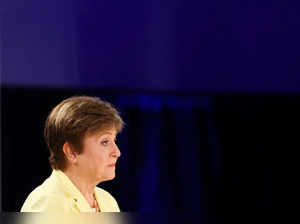 Reuters
ReutersIn her annual media roundtable with a group of reporters on Friday, she said global growth is expected to be steady in 2025, but with regional divergence.
Georgieva said she expects the Indian economy to be a little weaker in 2025. However, she did not explain it any further. The World Economy Outlook update week will have more details about it.
"The US is doing quite a bit better than we expected before, the EU is somewhat stalling, (and) India a little weaker," she said.
Brazil was facing somewhat higher inflation, she said.
In China, the world's second-largest economy, the International Monetary Fund (IMF) was seeing deflationary pressure and ongoing challenges with domestic demand, she said.
"Low-income countries, despite all the efforts they are making, are in a position when any new shock can affect them quite negatively," Georgieva said.
"What we expect in 2025 is to have quite a lot of uncertainty, especially in terms of economic policies. Not surprisingly, given the size and role of the US economy, there is keen interest globally in the policy directions of the incoming administration, in particular on tariffs, taxes, deregulation and government efficiency," Georgieva said.
"This uncertainty is particularly high around the path for trade policy going forward, adding to the headwinds facing the global economy, especially for countries and regions that are more integrated in global supply chains, medium-sized economies, (and) Asia as a region," she said.
That uncertainty is actually expressed globally through higher long-term interest rates, even though short-term interest rates have gone down, the IMF Managing Director said.
Donald Trump will be sworn in as the 47th President of the United States on January 20, replacing Joe Biden at the White House.
Trump, 78, has announced plans to impose additional tariffs on countries like China, Canada and Mexico. He has publicly announced the use of tariffs as a key policy tool.
On inflation, the IMF expects global disinflation to continue, Georgieva said.
"As we all recognise, the higher interest rates that were necessary to fight inflation did not push the world economy into recession. They have delivered the desired results. Headline inflation is converging back to target sooner in advanced economies than in emerging markets," she said.
GDP forecast:
India's Gross Domestic Product (GDP) is projected to grow at 6.4% in the fiscal year 2024-25, marking a four-year low and a sharp decline from the 8.2% growth recorded in FY24, according to first advance estimates released by the government earlier this week.The projection is lower than the recent Reserve Bank estimate of 6.6 per cent for the current fiscal year ending March 2025.
Releasing the first advance estimates of national income for 2024-25, the NSO said, "real GDP has been estimated to grow by 6.4 per cent in FY2024-25 as compared to the growth rate of 8.2 per cent in Provisional Estimate (PE) of GDP for FY2023-24".
The data also revealed that real Gross Value Added (GVA) is expected to expand by 6.4% in FY25, down from 7.2% in FY24. In contrast, nominal GVA is projected to grow at 9.3% in FY25, slightly higher than the 8.5% growth in the previous fiscal year.
The unexpected slowdown in the second quarter prompted the Reserve Bank of India (RBI) to revise its growth forecast for FY24. The RBI lowered its estimate to 6.6%, down from the earlier projection of 7.2%.
(With PTI inputs)
(Catch all the Business News, Breaking News, Budget 2024 Events and Latest News Updates on The Economic Times.)
Subscribe to The Economic Times Prime and read the ET ePaper online.
Read More News on
(Catch all the Business News, Breaking News, Budget 2024 Events and Latest News Updates on The Economic Times.)
Subscribe to The Economic Times Prime and read the ET ePaper online.










































 Get Unlimited Access to The Economic Times
Get Unlimited Access to The Economic Times
